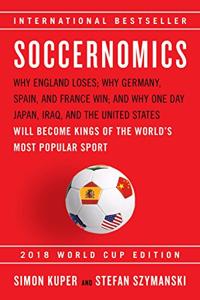
Want to learn the ideas in Soccernomics better than ever? Read the world’s #1 book summary of Soccernomics by Simon Kuper, Stefan Szymanski here.
Read a brief 1-Page Summary or watch video summaries curated by our expert team. Note: this book guide is not affiliated with or endorsed by the publisher or author, and we always encourage you to purchase and read the full book.
Video Summaries of Soccernomics
We’ve scoured the Internet for the very best videos on Soccernomics, from high-quality videos summaries to interviews or commentary by Simon Kuper, Stefan Szymanski.
1-Page Summary of Soccernomics
Overview
Most analysis of soccer is based on old cliches. We talk about how a new manager will change the team and what players we need to sign in order to win, but this might be wrong. The author says that clubs are more like supermarkets than people think and that wages are better predictors of success than transfer fees. He also compares soccer to the JFK assassination, saying they’re both popular sports with lots of conspiracy theories surrounding them.
Big Idea #1: Soccer is a small and historically bad business.
People who watch soccer today are concerned that it is no longer a sport, but rather big business. It’s now more about money than anything else and there isn’t as much passion in the game anymore, they say.
Soccer is one of the biggest sports in the world, but it’s never been big business. United Natural Foods, a distributor of organic foods, isn’t on the S&P 500 (the list of 500 largest publicly traded US companies). It’s smaller than Walmart and considered to be an average company by most standards. However, it’s bigger than every soccer club in the world.
Manchester United’s revenue was $689 million. That is a lot of money, but it is still less than 1% of Walmart’s and 0.2% of United Natural Foods’.
Most clubs are the size of a supermarket. However, that’s not what you would find in Europe; their average club revenues were less than $25 million.
One reason for this is that soccer clubs are not run like a business. Statistical analysis of English and Spanish clubs shows that they’re not trying to make money, which means they’re spending way too much on players’ salaries. If the goal is profit, then it’s best to aim for 15th place in the league so you can cut down on those high wages. Athletic Bilbao could save a lot by playing second division soccer because their players would be paid less.
The good news is that most clubs won’t go out of business because they’re not well run financially.
If a football team is performing badly, it can fire the players and hire new ones. That’s not how normal businesses work. Ford can’t just lay off workers if the company isn’t doing well; consumers won’t buy inferior products. It’s true that there’s more money in soccer than ever before, but most fans are happy because their teams are trying to win rather than make a lot of money.
Big Idea #2: Managers don’t usually matter all that much to a team’s success.
Most managers are mediocre. The media and fans alike focus on a manager’s appointment, but the reality is that most of them don’t make much of an impact. For proof, look at one of England’s greatest soccer feats overseen by a manager who was considered mediocre at best.
Claudio Ranieri’s career was mediocre for most of it. He joined Leicester after being fired from Greece following a loss to the Faroe Islands, and he had only managed lowly teams before then. However, in his first season with Leicester City, they won the Premier League title—a surprise that no one expected. However, this new version of Claudio Ranieri didn’t last long: 25 games into the next season, he was sacked with a 5-5 record.
If a manager is mediocre for most of his/her career, it’s unlikely that he was the cause of success in one season. Managers don’t perform brilliantly one season only to be a disaster the next. This idea seems to contradict an observable phenomenon – when a manager is sacked, performance does tend to improve. However, this bounce can easily be explained by regression toward the mean (when results return to normal levels after hitting rock bottom). If Manchester City had stuck with Mark Hughes after bad performances at the end of his tenure, they very likely would have seen results improve and Hughes would have taken credit for their subsequent success instead of Roberto Mancini.





